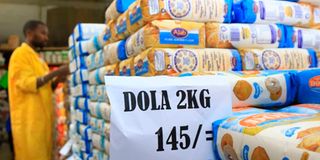City poor see faster rise in cost of living than the rich

An attendant arranges stacks of wheat flour at Chieni supermarket in Nyeri town in January. J
The cost of living increased fastest for Nairobi’s low income earners in March, compared to the rich and the middle class. It was also above both the city’s and national average, underlining the effects of the widening income gap.
Data from the Central Bank of Kenya (CBK) shows that, while the cost of living rose 5.9 per cent for Nairobi’s low income earners, it rose only 3.77 per cent for upper income earners and 4.05 per cent for middle income earners.
About 71 per cent of Nairobi’s households are low income earners, spending below Sh46,355 monthly, showcasing the vast population affected by the year-on-year commodity price increases. Meanwhile, only 3.53 per cent of households in the city are upper income earners spending above Sh184,395 monthly, with the income segment continually enjoying a lower inflation rate each month compared to both the national and city average.
Low income earners are vulnerable to the rising cost of living, especially due to their spending patterns that see a large chunk of their income spent on basics such as food, water, rent and electricity.
For instance, official data shows that, while the poor spend about 36.3 per cent of their income on food alone, the rich spend only 16.8 per cent on the same, which places the former at a disadvantage with food prices continually on the rise in recent months amid shortages both locally and in global markets.
Food prices rose 9.92 per cent in March, which is the highest year-on-year increase since November, driven by increases in the cost of foodstuff such as maize flour, rice, meat and wheat flour.
This comes just weeks after the World Bank announced that it is set to raise the international poverty line for the first time in seven years, in a move that will increase the number of Kenyans classified as living in extreme poverty.
World Bank announced that it will raise the global poverty line from the current $1.90 (Sh220) a day to $2.15 (Sh249) a day to reflect the rising cost of living across the globe. This means that people who spend less than Sh249 daily will now be classified as living in extreme poverty, up from the current Sh220.
Kenyans have, however, been spared a further rise in the cost of living after Parliament on Tuesday shot down proposals by the National Treasury to increase the cost of commodities through new taxes.
This has been seen as a move aimed at pleasing voters by the legislators ahead of the August 9 General Election at a time Kenyans have continually expressed displeasure over the rising cost of living driven by sharp increase in the prices of fuel, food and other basic goods.
Treasury had hoped to collect Sh50.4 billion from the new taxes, which would have raised the cost of maize flour, wheat flour, bottled water, fruit juices, and motorcycles to finance the Sh3.3 trillion budget for the financial year that begins in July.
Also Read: What matters most to Mombasa voters
The National Assembly’s Committee on Finance and Planning shot down Treasury’s proposal to raise excise duty on motorcycles, arguing that the tax increase would make them unaffordable to most Kenyans, denying boda boda operators a source of living from the sector that employs about two million people.
The committee, which is chaired by Homa Bay Woman Representative Gladys Wanga, also shot down a proposal to impose value added tax (VAT) on maize flour, wheat, meslin (wheat and rye mixture) and cassava flour, noting that it would lead to a further increase in their cost.
Lobby group Stop Crime Kenya had warned that the new taxes would increase black market trade and force Kenyans into buying cheap substandard goods.
“Tax increases threaten to drive increasing numbers of these honest, hard-working Kenyans to the illegal sector in search of more affordable goods. In so doing, citizens are put at risk from substandard and unregulated products, while criminals get rich and Treasury is deprived of much-needed revenue,” said the lobby’s chairman, Mr Stephen Mutoro.





